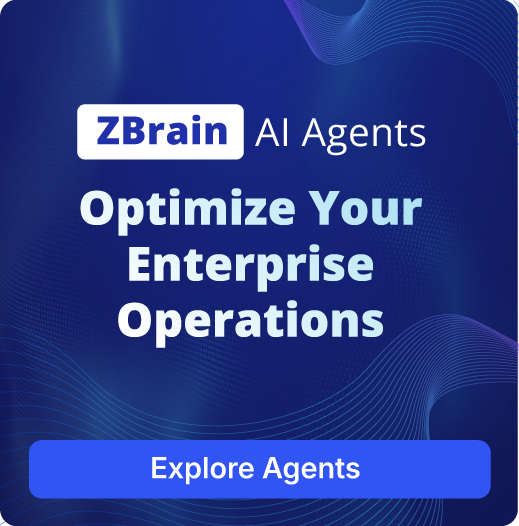Generative AI in logistics: Use cases, integration approaches, development and future

The logistics industry is undergoing a major transformation, driven by the rise of e-commerce, increasing customer expectations, and the need for greater efficiency and resilience. Generative AI is central to this transformation, set to redefine how goods are transported and managed.
Generative AI, with its ability to generate fresh content, analyze data, and streamline processes, presents a valuable solution for the complex challenges logistics providers encounter. From inventory management and route optimization to task automation and improving customer experiences, integrating generative AI in logistics is set to transform every aspect of the supply chain.
This article explores the potential of generative AI in logistics, examining key use cases, different approaches to integration, and how platforms like ZBrain contribute to enhancing operational efficiency in the industry.
- What is generative AI?
- Generative AI in logistics
- The different approaches to integrating generative AI into logistics systems
- Key use cases of generative AI in logistics
- Measuring the ROI of generative AI in logistics services
- Challenges and considerations in adopting generative AI for logistics services
- Future outlook of generative AI in logistics services
- Transforming logistics services with full-stack generative AI
What is generative AI?
Generative AI refers to artificial intelligence systems capable of producing new content like text, images, audio, or video. These systems rely on advanced machine learning models, particularly deep learning, to identify patterns and structures in large datasets. By learning from this data, generative AI models can create original content that mirrors the characteristics of the material they were trained on, simulating human-like creativity.
Popular generative AI models include Variational Autoencoders (VAEs), Generative Adversarial Networks (GANs), autoregressive models, and transformers. Each of these models plays a role in powering the generative capabilities seen today, from producing realistic images to generating coherent and creative text.
Generative AI in logistics
Generative AI is poised to transform logistics by automating repetitive tasks, improving efficiency, and enhancing decision-making. These powerful models can generate optimized route plans, analyze demands, and even create personalized customer experiences. For example, generative AI can analyze historical shipping data to identify patterns and generate accurate forecasts for future demand, allowing logistics providers to adjust inventory levels and optimize resource allocation proactively. Additionally, incorporating generative AI in logistics can assist with route planning by taking into account real-time traffic conditions, weather patterns, and delivery deadlines, minimizing delivery times and reducing transportation costs. Moreover, these AI systems can generate customized communication strategies for customers, providing them with timely updates and personalized tracking information, improving overall customer satisfaction.
The different approaches to integrating generative AI into logistics systems
Integrating generative AI into logistics systems can be approached in three distinct ways, each with its own advantages and limitations:
- Custom AI stacks – This method provides maximum customization and control. Companies with significant resources and in-house data science expertise can build their own generative AI systems tailored precisely to their specific needs. This enables maximum flexibility and the integration of specific company data and domain expertise. However, developing and maintaining a custom AI stack requires substantial investment in talent, infrastructure, and ongoing development, making it a costly and time-consuming undertaking.
- AI point solutions – These pre-built solutions provide a more readily accessible and cost-effective option. They focus on specific areas of logistics, such as route optimization or inventory management. They require less in-house expertise and offer a faster implementation timeframe. However, they often lack the flexibility of custom solutions and may not fully address all the unique challenges faced by individual companies.
- Full stack platforms like ZBrain – ZBrain Builder is a comprehensive orchestration engine designed to streamline the implementation of generative AI across logistics and various other business processes. It enables users to create custom logistics applications by integrating a range of generative AI models and tools. With ZBrain Builder, users can connect proprietary data, GenAI models, third-party apps, software, and APIs to build advanced GenAI solutions with minimal setup, allowing for fast and efficient deployment.
Why is ZBrain Builder the ideal platform for logistics businesses?
-
Flexible model selection: ZBrain Builder provides access to a diverse range of proprietary and open-source LLMs, including GPT-4, PaLM-2, Llama-3 and Gemini. Users can also integrate private models for enhanced customization.
-
Seamless integration into workflows: ZBrain’s ability to seamlessly connect with existing tools like Slack, Microsoft Teams, APIs, and other platforms allows logistics businesses to improve their workflows, enhance team collaboration, and streamline communication across departments. This connectivity ensures smoother operations, faster response times, and improved customer services by unifying their technology ecosystem.
-
Low-code interface: The platform facilitates the creation of custom “Flows” for applications to handle diverse use cases through a user-friendly, low-code interface. The platform facilitates the creation of custom “Flows” for applications to handle diverse use cases through a user-friendly, low-code interface. The platform’s intuitive, low-code interface empowers you to create custom “Flows,” defining the sequence of actions and logic that drive the solutions you build. These custom Flows enable you to address a wide range of logistics use cases with precision and efficiency.
-
Knowledge base: ZBrain Builder enables seamless integration with diverse data sources. This allows for extracting crucial information, enabling highly accurate and contextually relevant outputs.
-
Adaptive learning: ZBrain’s GenAI solution continuously can improve by integrating human feedback, enabling them to adjust and refine their responses over time for increased accuracy.
ZBrain empowers organizations to rapidly implement and scale their GenAI strategies, eliminating the need for extensive AI developer resources. Whether a small team or a large enterprise, ZBrain provides the tools and flexibility to bring your AI vision to life.
Streamline your operational workflows with ZBrain AI agents designed to address enterprise challenges.
Key use cases of generative AI in logistics
Generative AI’s capabilities are transforming the logistics industry, creating new possibilities for efficiency, optimization, and enhanced customer experiences. Let’s look at the key use cases of generative AI in logistics and how ZBrain’s capabilities apply to these use cases:
|
Generative AI use cases |
Description |
How ZBrain helps |
|
Demand planning |
AI-powered demand planning uses generative AI to optimize inventory levels and production planning based on anticipated future demand.
|
ZBrain’s advanced data analysis capabilities can assist with demand planning by identifying patterns within historical data and market information. This allows logistics providers to develop more informed strategies for managing inventory, adjusting production schedules, and optimizing resource allocation to meet anticipated demand better. |
|
Quality control |
Analyzing data to identify product anomalies, reduce human error and improve product consistency. |
ZBrain’s product quality monitoring agent automates the analysis of supplier inspection reports and defect rates, identifying any deviations from expected standards to ensure consistent quality and accuracy. |
|
Warehouse management |
Optimizing inventory placement and picking strategies for faster and more efficient order fulfillment. |
ZBrain can suggest optimal inventory placement to maximize storage capacity, reduce picking times, and improve overall warehouse efficiency. |
|
Customer experience |
Providing personalized communication, tracking updates, and proactive customer support based on individual preferences. |
ZBrain’s AI-powered agents and virtual assistants can generate customized communication strategies, offer personalized updates, answer customer queries, and provide proactive support, enhancing customer satisfaction and loyalty. |
|
Freight optimization |
Matching available freight capacity with demand, optimizing cargo loading, and minimizing empty miles. |
ZBrain solutions can analyze real-time freight data and help identify optimal matches between shippers and carriers, maximizing freight capacity utilization, reducing transportation costs, and minimizing empty miles. |
|
Order status update |
Automatically delivering order status updates to customers, improving customer engagement through timely and personalized communication. |
ZBrain’s order status update agent automatically notifies customers of their order status at key stages (e.g., order received, processing, shipped, delivered) through their preferred communication channels, such as email or SMS, easing the burden on customer support teams. |
|
Risk management |
Identifying potential disruptions, such as weather events or supply chain disruptions, and developing mitigation strategies. |
ZBrain can identify potential risks and generate proactive mitigation strategies based on historical data and market trends, reducing disruptions and minimizing financial losses. |
|
Tax compliance |
Ensuring adherence to legal and regulatory tax requirements through automated document validation and risk assessment. |
ZBrain’s tax compliance validation agent automates the validation of tax information, such as VAT and GST, on purchase orders. The agent conducts thorough tax accuracy checks against current tax laws and regulations, flagging discrepancies, ensuring compliance with regulations and reducing the risk of costly audits or penalties. |
|
Process automation |
Automating repetitive tasks, such as data entry, order processing, and document generation, to free up human resources for more strategic work. |
ZBrain-based solutions can automate repetitive tasks, freeing up human resources for more strategic work, such as problem-solving, customer service, and process improvement. |
|
Generative AI for inventory management |
Optimizing inventory levels based on demand forecasts, lead times, and cost considerations. |
ZBrain can analyze historical data, demand patterns and lead times to generate optimal inventory levels, minimize stockouts, reduce storage costs, and ensure timely fulfillment of customer orders. |
|
Feedback summarization |
Creating summaries of customer feedback to uncover key insights and recurring issues. |
ZBrain’s feedback summarization agent automatically analyzes customer feedback, generating concise summaries that highlight key trends, common issues and areas for improvement, enabling customer service teams to make data-driven decisions. |
|
Supply chain automation |
Designing and managing supply chain networks for maximum efficiency, cost-effectiveness, and resilience. |
ZBrain solutions can analyze supply chain data, identify bottlenecks, and suggest optimizations for sourcing, production, inventory management, and distribution, leading to significant cost savings and improved responsiveness. |
|
Inquiry routing |
Automatically routing customer inquiries to the appropriate individual or department based on the content and categorization of the inquiry. |
ZBrain’s inquiry routing agent automates the sorting and routing of customer inquiries, ensuring they reach the right department or support agent for efficient resolution and enhancing customer satisfaction. |
|
Supplier reference verification |
Automating the process of checking supplier references to ensure that past performance aligns with procurement requirements. |
ZBrain’s supplier reference verification agent automates the process of checking supplier references, providing a detailed assessment of a supplier’s past performance and flagging any inconsistencies or red flags. |
|
Supplier contact information update |
Maintaining accurate and up-to-date supplier contact details through automated data validation and updates. |
ZBrain’s supplier contact information update agent automatically sorts and updates supplier contact information, keeping the procurement database accurate and current with minimal manual effort, reducing administrative workload. |
Streamline your operational workflows with ZBrain AI agents designed to address enterprise challenges.
Measuring the ROI of generative AI in logistics services
The Return on Investment (ROI) from generative AI is measured by assessing both tangible cost reductions and qualitative improvements in operational efficiency and customer satisfaction. This involves carefully examining the initial and ongoing costs against the benefits realized through AI deployment. The process typically combines quantitative metrics such as reduced transportation costs, optimized inventory management, and improved delivery times alongside qualitative gains in customer experience and streamlined decision-making.
Key ROI indicators from ZBrain implementation in logistics businesses:
Reduced operational costs and better efficiency
-
Use case: Automated documentation and data analysis for compliance.
-
ROI metrics: Reduced administrative burden, improved compliance rates, and minimized legal risks.
-
Example: ZBrain can automate the generation and analysis of logistics documents, ensuring compliance with regulatory requirements and minimizing the risk of errors. This allows redirecting valuable resources to be allocated to other tasks and reduces the administrative burden, leading to enhanced operational efficiency and lower costs.
Improved customer satisfaction
-
Use case: Personalized delivery tracking and proactive communication.
-
ROI metrics: Increased customer satisfaction scores, reduced customer complaints, and enhanced brand loyalty.
-
Example: ZBrain can generate personalized delivery updates and notifications, providing customers with real-time information about their shipments. This proactive communication fosters transparency and trust, leading to higher customer satisfaction and reduced complaints.
Faster decision-making processes
-
Use case: Automated supplier selection and negotiation based on real-time market data and performance metrics.
-
ROI metrics: Reduced procurement costs, optimized supplier relationships, and improved supply chain resilience.
-
Example: ZBrain can analyze real-time market data, supplier performance metrics (e.g., quality, delivery times, pricing), and industry trends to identify the most suitable suppliers for specific requirements. This allows logistics teams to make data-driven decisions about selecting suppliers, negotiating favorable terms, and optimizing supplier relationships. By automating this process, ZBrain streamlines decision-making, leading to faster negotiations, more efficient procurement, and improved overall supply chain performance.
Streamlined resource management
-
Use case: Warehouse management and warehouse optimization.
-
ROI metrics: Reduced warehouse space requirements, improved resource utilization, and minimized operational downtime.
-
Example: ZBrain can analyze warehouse data to optimize layout, storage allocation, and material handling processes, leading to reduced warehouse space requirements, improved resource utilization, and minimized operational downtime. This helps drive to substantial cost savings and better operational efficiency.
ZBrain’s intelligent solutions have the potential to help logistics businesses streamline operations, enhance customer experiences, and reduce costs, showcasing how generative AI might benefit the industry.
Challenges and considerations in adopting generative AI for logistics services
While generative AI holds immense potential to transform logistics, its adoption comes with certain challenges and considerations that need careful attention. The challenges in adopting generative AI into logistics operations are:
- Data availability and quality: Generative AI models depend on large volumes of high-quality data for training. Logistics companies may struggle to access and curate sufficient data, especially for specialized operations or niche markets.
- Model transparency and explainability: The complex nature of generative AI models can make their decision-making processes opaque, raising concerns about bias and lack of transparency.
- Integration with existing systems: Integrating AI systems into legacy IT infrastructure can be complex and time-consuming, potentially disrupting existing workflows.
- Cost and resource allocation: Implementing and maintaining generative AI systems can require significant financial investments, potentially exceeding the budget of some logistics companies.
- Cybersecurity and data privacy: Ensuring the security of sensitive data used for AI model training and deployment is paramount, especially in the logistics industry, where confidential information is frequently handled.
How ZBrain helps
ZBrain addresses the challenges of generative AI adoption in logistics in the following ways:
-
ZBrain’s robust data integration capabilities: ZBrain seamlessly integrates with existing data sources, allowing companies to leverage their current data assets.
-
ZBrain’s focus on explainable AI: ZBrain prioritizes model explainability by providing insights into the reasoning behind AI-generated outputs, enhancing trust and understanding.
-
Human-in-the-loop approach: ZBrain allows for human feedback and intervention, ensuring that models remain aligned with human values and expectations and offer accurate responses.
-
APIs for integration: ZBrain Builder offers readily available APIs, facilitating seamless integration with existing systems, minimizing disruption and maximizing compatibility.
-
Modular design and scalability: ZBrain’s modular design enables companies to start with specific use cases and scale their AI adoption as needed.
-
ZBrain’s cost-effective approach: ZBrain provides a subscription-based model with flexible pricing plans, making generative AI accessible to companies of all sizes.
-
Optimized resource utilization: ZBrain’s monitoring tools help optimize resource allocation, ensuring efficient use of computational power and minimizing unnecessary expenses.
-
ZBrain’s robust security measures: ZBrain emphasizes data security through strong encryption, strict access control, and adherence to industry standards.
-
Private data handling: ZBrain ensures that clients’ sensitive data remains within their control.
By tackling these challenges and taking these factors into account, logistics companies can leverage the power of generative AI, unlocking significant opportunities for efficiency, optimization, and innovation. ZBrain, with its comprehensive platform and commitment to addressing these key concerns, is well-positioned to be a critical partner in this journey.
Future outlook of generative AI in logistics services
Generative AI is set to reshape the future of logistics services, driving innovation and efficiency across the entire supply chain.
Long-term trends and future applications of generative AI for logistics
-
Hyper-personalized logistics: AI-powered systems will personalize logistics solutions, tailoring routes, delivery times, and communication-based on individual customer preferences and real-time data. This will lead to better customer experience and increased loyalty.
- AI-powered automation in logistics: AI will be instrumental in the development and implementation of autonomous vehicles, robots, and drones for transportation and warehouse operations, leading to greater efficiency, reduced costs, and improved safety.
-
Data-driven decision-making: Generative AI will provide logistics providers with real-time data analysis and insights, allowing them to make informed decisions and optimize each step of the supply chain.
-
Sustainability and green logistics: Generative AI will help optimize transportation routes, decrease empty miles, and lower fuel consumption, leading to a more sustainable and environmentally friendly logistics sector.
The evolving role of platforms like ZBrain Builder in shaping the future of logistics services:
Platforms like ZBrain Builder have the potential to play a key role in driving the adoption of generative AI within the logistics industry. They will:
-
Democratize access to AI: Provide user-friendly interfaces and pre-trained models, making AI accessible to companies of all sizes, regardless of their technical expertise.
-
Facilitate seamless integration: Offer flexible integration capabilities that ensure seamless integration with existing logistics systems, enabling faster and more efficient implementation of AI solutions.
-
Foster innovation and collaboration: Act as a hub for technology innovation, connecting AI developers, researchers, and logistics providers to accelerate the development and adoption of new GenAI-powered solutions
-
Provide ongoing support and expertise: Offer continuous support and updates, ensuring that AI models stay up-to-date and relevant, adapting to evolving business needs and market trends.
As generative AI matures and becomes more sophisticated, platforms like ZBrain will be instrumental in transforming the logistics landscape. They will enable companies to leverage the power of AI to optimize their operations, enhance customer experience, and build a more resilient and sustainable supply chain. The future of logistics is intrinsically tied to the advancement of generative AI, and platforms like ZBrain will play a key role in this exciting transformation.
Transforming logistics services with full-stack generative AI
ZBrain, with its AI capabilities, helps organizations streamline financial reporting by automating data analysis, ensuring compliance, and improving accuracy. It provides a range of features designed to enhance efficiency, reduce errors, and support data-driven decision-making.
-
AI readiness assessment: ZBrain’s AI readiness assessment framework, ZBrain XPLR, evaluates an organization’s preparedness for AI adoption in financial reporting. It provides actionable insights to identify strengths, gaps, and opportunities for automation, ensuring a smooth AI implementation.
-
Low-code development: ZBrain’s low-code platform, ZBrain Builder, enables finance teams to create custom AI solutions for report generation, variance analysis, and compliance checks without requiring extensive technical expertise.
-
Proprietary data utilization: The platform allows organizations to leverage their proprietary financial data effectively, ensuring AI models are aligned with specific reporting requirements, accounting standards, and industry regulations.
-
Enterprise-ready: Designed for large-scale financial operations, ZBrain Builder offers security, scalability, and seamless integration with enterprise resource planning (ERP) and financial management systems, enabling efficient financial reporting at scale.
-
End-to-end support: ZBrain Builder manages the entire lifecycle of AI-driven financial reporting—from data ingestion to report generation and compliance validation—ensuring accurate, timely, and regulatory-compliant reporting.
-
Flexible data ingestion: ZBrain integrates financial data from multiple sources, including accounting software, enterprise databases, and compliance records, to provide real-time insights that improve reporting accuracy, risk assessment, and financial forecasting.
-
Intelligent agent creation: AI agents built on ZBrain Builder can automate key financial reporting tasks, such as variance analysis, fraud detection, and regulatory compliance checks, reducing manual effort and enhancing reporting accuracy.
These capabilities position ZBrain as a powerful tool for organizations looking to optimize their financial reporting processes, ensuring accuracy, efficiency, and compliance in an increasingly complex regulatory landscape.
Ready to unlock the full potential of generative AI for your logistics operations? Start building your custom apps with ZBrain today and experience the future of intelligent logistics.
Listen to the article
Author’s Bio

An early adopter of emerging technologies, Akash leads innovation in AI, driving transformative solutions that enhance business operations. With his entrepreneurial spirit, technical acumen and passion for AI, Akash continues to explore new horizons, empowering businesses with solutions that enable seamless automation, intelligent decision-making, and next-generation digital experiences.
Table of content
- What is generative AI?
- Generative AI in logistics
- The different approaches to integrating generative AI into logistics systems
- Key use cases of generative AI in logistics
- Measuring the ROI of generative AI in logistics services
- Challenges and considerations in adopting generative AI for logistics services
- Future outlook of generative AI in logistics services
- Transforming logistics services with full-stack generative AI
Frequently Asked Questions
What is ZBrain, and how can it optimize logistics operations with AI?
ZBrain is an end-to-end AI enablement platform that assists businesses in streamlining AI adoption across various functions, including logistics operations. From assessing AI readiness to solution development and deployment, ZBrain offers comprehensive support to optimize supply chain management, inventory control, route planning, and customer service processes.
Here’s how ZBrain enhances logistics operations:
-
AI readiness assessment with ZBrain XPLR: ZBrain XPLR provides a comprehensive AI readiness assessment, enabling organizations to evaluate current logistics processes and identify strategic opportunities for AI integration, thereby enhancing operational efficiency and informing data-driven decision-making.
-
Seamless data ingestion and integration: ZBrain Builder integrates with Warehouse Management Systems (WMS), Transportation Management Systems (TMS), and other logistics platforms to ensure smooth data flow. This integration enables businesses to develop AI agents that analyze both structured and unstructured data, facilitating better route optimization and compliance decisions.
-
Low-code development environment: ZBrain Builder’s intuitive, low-code interface empowers teams to quickly build and deploy AI-driven solutions with minimal coding expertise. This accelerates the automation of logistics processes, from inventory management and route planning to customer service enhancements.
-
Cloud and model flexibility: ZBrain supports various AI models such as GPT-4 and LLaMA and integrates seamlessly with cloud platforms like AWS, Azure, and GCP, providing the flexibility to select the optimal infrastructure for cost-effective, scalable logistics solutions.
-
Enhanced compliance and governance: ZBrain’s AI capabilities help ensure continuous monitoring and compliance with industry regulations, safety standards, and internal policies related to logistics operations. By flagging potential risks in supply chain management, transportation, and inventory control, ZBrain strengthens operational governance and audit readiness.
By offering a low-code platform with powerful data integration and customizable AI capabilities, ZBrain enables organizations to automate, optimize, and innovate their logistics processes, enhancing customer satisfaction, reducing operational costs, and improving overall efficiency.
How does ZBrain ensure the security and privacy of sensitive data in logistics operations?
ZBrain is built with a strong focus on data privacy and security, ensuring that sensitive logistics information is protected at all stages. Here’s how ZBrain safeguards sensitive data in logistics operations:
Private cloud deployments:
ZBrain AI agents can be deployed in a private cloud environment, ensuring that critical logistics data, such as shipment details, inventory levels, and supplier information, is securely stored within the organization’s infrastructure.
Robust security features:
ZBrain incorporates multiple layers of security to protect sensitive data, including:
-
Access controls:
Granular role-based access controls ensure only authorized personnel can view or manage sensitive logistics-related data, such as transportation schedules, warehouse inventories, and supplier contracts.
Compliance and governance:
-
ZBrain is designed to meet industry-specific regulations and standards ISO 27001:2022 and SOC 2 Type II, ensuring that logistics data complies with confidentiality, integrity, and accountability requirements.
This comprehensive security approach ensures that sensitive logistics data remains protected throughout its lifecycle—from procurement and transportation to delivery and returns management.
Can ZBrain AI agents be integrated with existing logistics management systems?
Yes, ZBrain AI agents are designed to integrate seamlessly with existing logistics management systems. The platform supports various data formats and standards, ensuring smooth interoperability with legacy Warehouse Management Systems (WMS), Transportation Management Systems (TMS), and other logistics platforms.
This integration allows organizations to:
-
Leverage existing infrastructure: Enhance current logistics processes without the need for a complete overhaul of legacy systems.
-
Enrich data and workflows: Connect ZBrain AI agents with existing tools to automate inventory management, route planning, and shipment tracking workflows, improving data accessibility and efficiency.
-
Drive AI-driven insights: Utilize gen AI capabilities to optimize supply chain strategies, monitor logistics performance, and enhance decision-making while maintaining compatibility with existing technologies.
By enabling seamless integration, ZBrain ensures that organizations can modernize their logistics operations without disrupting existing systems, improving overall operational efficiency.
What kind of AI agents can be built on ZBrain Builder for optimizing logistics operations?
ZBrain Builder enables the development of AI agents tailored to various logistics management use cases. These agents support tasks such as inventory management, route optimization, shipment tracking, and compliance monitoring. ZBrain’s advanced gen AI capabilities help organizations optimize data integration, automate manual tasks, and provide AI-driven insights to enhance decision-making. ZBrain helps businesses deliver a more efficient and responsive logistics management system by streamlining workflows and improving logistics processes.
How does ZBrain cater to diverse logistics needs across business operations?
ZBrain’s flexibility allows it to address various logistics management needs. You can create tailored AI agents to automate inventory management, optimize transportation routes, track shipments, and ensure regulatory compliance. These efficient AI agents enable businesses to enhance operational efficiency, accuracy, and decision-making across various logistics processes in any industry.
How can we measure the ROI of ZBrain in our logistics processes?
Measuring the return on investment (ROI) of ZBrain in logistics management involves evaluating key performance indicators (KPIs) related to automation, operational efficiency, and cost reduction. Here are some important metrics to consider:
-
Reduced manual effort: Automating tasks such as inventory management, shipment tracking, and route planning leads to faster processing, fewer errors, and improved accuracy.
-
Faster delivery times: Optimizing logistics workflows and ensuring timely dispatching improves customer satisfaction and accelerates delivery schedules.
-
Improved accuracy in inventory and compliance: Automated validation processes reduce errors, ensuring accurate inventory levels and adherence to regulatory requirements.
-
Operational efficiency: Streamlined workflows, real-time data updates, and automated processes help lower operational costs and enhance overall logistics performance.
By monitoring these KPIs, businesses can quantify how ZBrain drives efficiency, reduces errors, and optimizes logistics management processes.
How can I get started with ZBrain for my logistics processes?
To begin using ZBrain to optimize your logistics processes, reach out to us at hello@zbrain.ai or fill out the inquiry form on our website. Our team will get in touch with you to explore how our platform can integrate with your existing logistics systems and streamline logistics workflows.
Insights

Why Structured Architecture Design Is the Foundation of Scalable Enterprise Systems
Structured architecture design guides enterprises from requirements to build-ready blueprints. Learn key principles, scalability gains, and TechBrain’s approach.
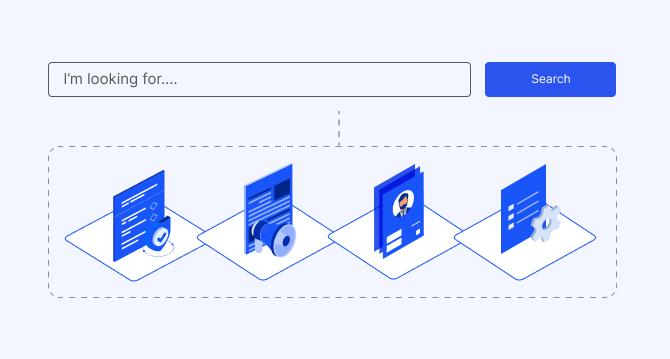
A guide to intranet search engine
Effective intranet search is a cornerstone of the modern digital workplace, enabling employees to find trusted information quickly and work with greater confidence.
Enterprise knowledge management guide
Enterprise knowledge management enables organizations to capture, organize, and activate knowledge across systems, teams, and workflows—ensuring the right information reaches the right people at the right time.
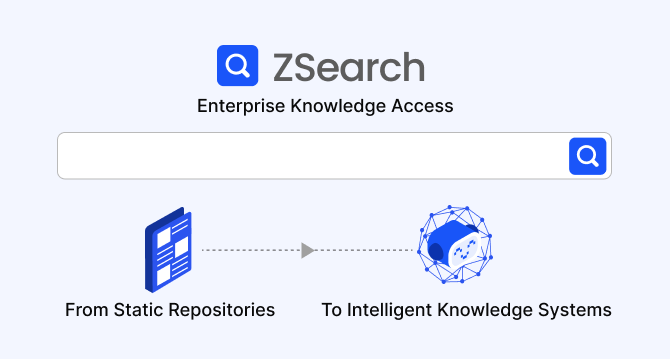
Company knowledge base: Why it matters and how it is evolving
A centralized company knowledge base is no longer a “nice-to-have” – it’s essential infrastructure. A knowledge base serves as a single source of truth: a unified repository where documentation, FAQs, manuals, project notes, institutional knowledge, and expert insights can reside and be easily accessed.
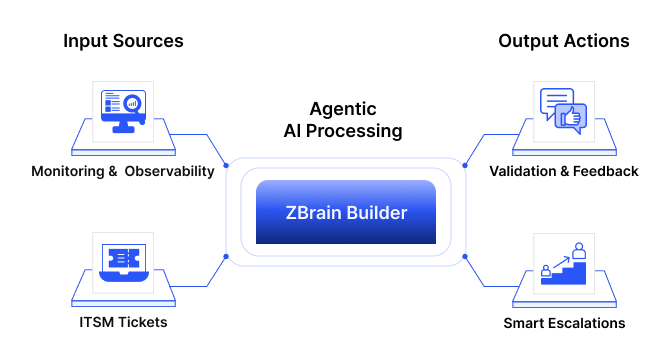
How agentic AI and intelligent ITSM are redefining IT operations management
Agentic AI marks the next major evolution in enterprise automation, moving beyond systems that merely respond to commands toward AI that can perceive, reason, act and improve autonomously.
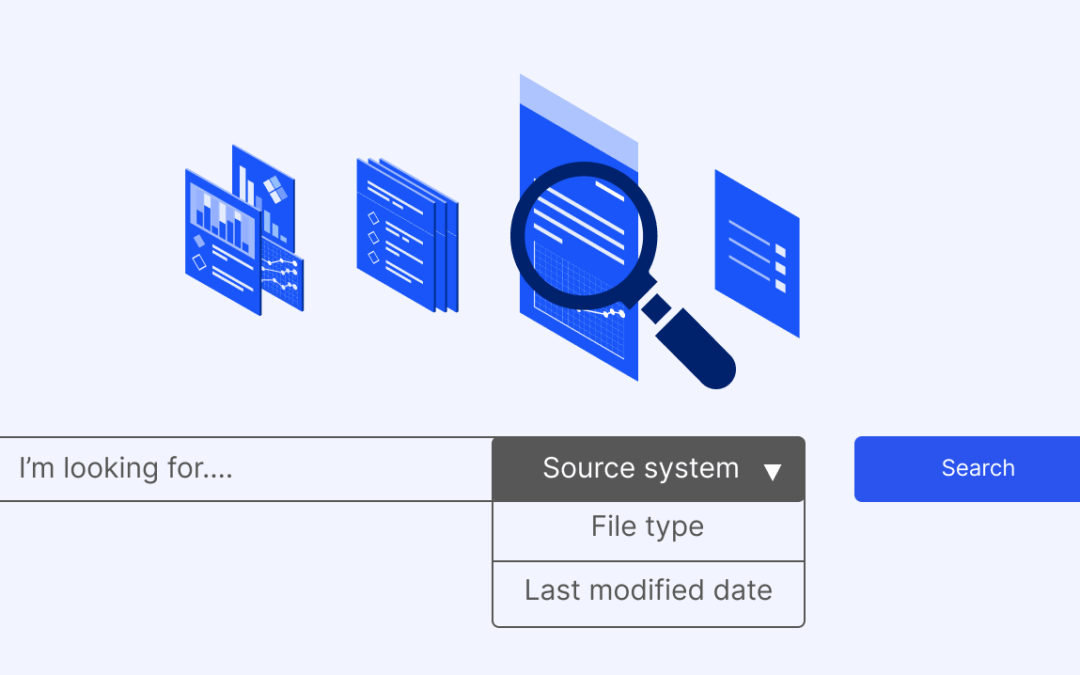
What is an enterprise search engine? A guide to AI-powered information access
An enterprise search engine is a specialized software that enables users to securely search and retrieve information from across an organization’s internal data sources and systems.
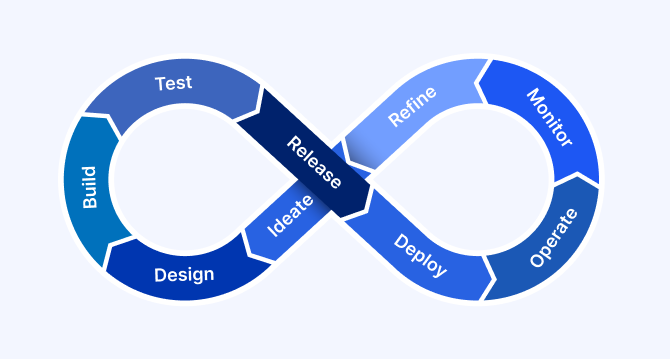
A comprehensive guide to AgentOps: Scope, core practices, key challenges, trends, and ZBrain implementation
AgentOps (agent operations) is the emerging discipline that defines how organizations build, observe and manage the lifecycle of autonomous AI agents.
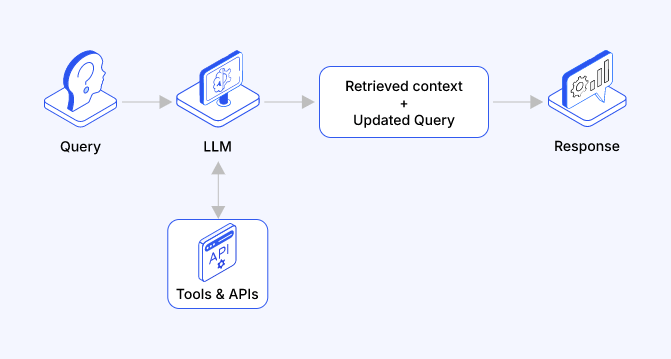
Adaptive RAG in ZBrain: Architecting intelligent, context-aware retrieval for agentic AI
Adaptive Retrieval-Augmented Generation refers to a class of techniques and systems that dynamically decide whether or not to retrieve external information for a given query.
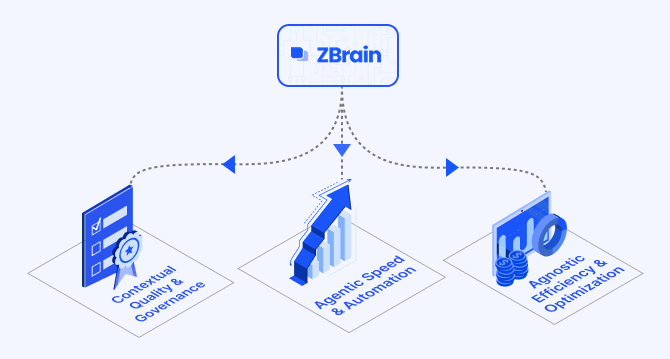
How ZBrain breaks the trade-offs in the AI iron triangle
ZBrain’s architecture directly challenges the conventional AI trade-off model—the notion that enhancing one aspect inevitably compromises another.




